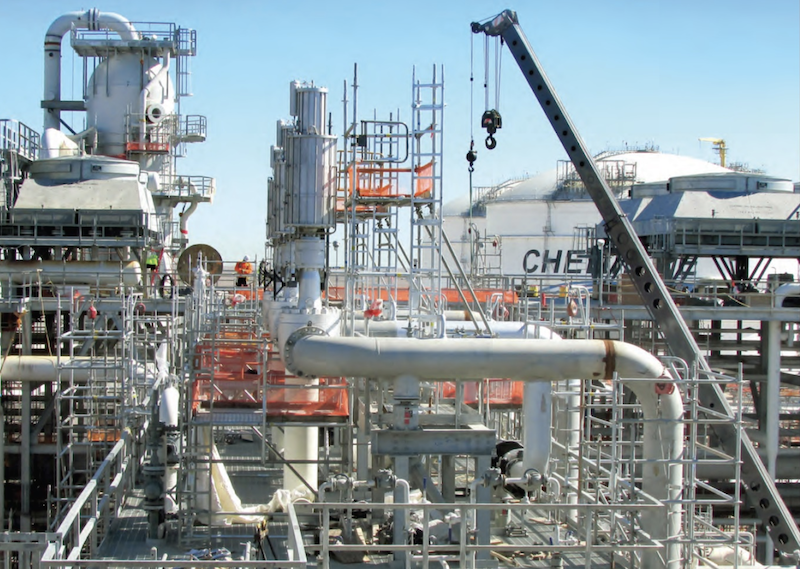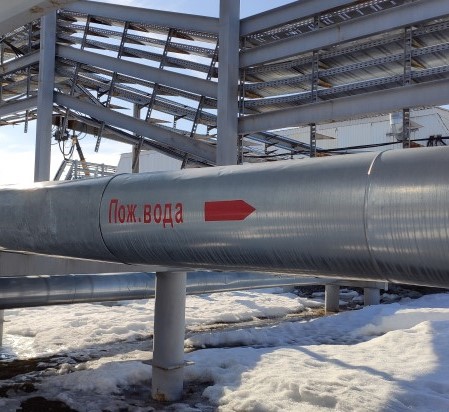March 2022, Vol. 249, No. 3
Projects
Projects March 2022
Cheniere Substantially Completes Sabine Pass Train 6
Cheniere Energy Partners announced the substantial completion of its sixth liquefaction train at Sabine Pass and said construction partner Bechtel handed over the project after its commissioning was complete.
Cheniere Partners and Bechtel have now declared substantial completion on all six trains at the Sabine Pass LNG Project, ahead of each train’s guaranteed completion date and within project budgets, the Cheniere Energy subsidiary said.
“With nine total trains across both the Sabine Pass and Corpus Christi projects, the Cheniere liquefaction platform is the second largest in the world,” said Jack Fusco, chairman, president and CEO of Cheniere Partners, citing “the world-class standard of execution” throughout the project with Bechtel Oil, Gas and Chemicals.
“We look forward to opportunities to build upon our platform with disciplined, brownfield growth at both sites in the future,” Fusco said.
With the addition of Train 6, the Cheniere-owned Sabine Pass LNG terminal in Cameron Parish, Louisiana, now has a total LNG production capacity of approximately 30 mtpa. The terminal also has operational regasification facilities that include five LNG storage tanks, vaporizers, and two marine berths, with a third marine berth under construction.
Cheniere Partners also owns the Creole Trail Pipeline, which interconnects the Sabine Pass LNG terminal with a number of large interstate pipelines.
US Unveils $1.15 Billion for Abandoned Oil, Gas Well Cleanup
The White House will make $1.15 billion available to states to clean up abandoned oil and gas wells as part of a broad effort to reduce U.S. climate warming emissions and improve health and safety in nearby communities.
The money represents a portion of the $4.7 billion for well cleanup that was included in the infrastructure law passed in Congress last year.
The administration said 26 states are eligible to apply for the funding, or nearly every state that has documented orphaned wells, defined as wells with an owner that is either unknown or insolvent.
Texas and Pennsylvania are eligible for the most funding of $107.5 million and $104.2 million, respectively.
In a statement, the Department of Interior, which is overseeing the program, said each state would be allocated an initial $25 million grant, and additional funding based on its number of documented oil and gas wells, the estimated cost for plugging wells there, and the number of job losses sustained between March 2020 and November 2021.
The number of abandoned wells in the United States has grown over the last decade, and many experts believe the number will keep growing as fossil fuels are replaced by cleaner forms of energy.
Shell Reroutes Oil Supplies after Cyberattack on German Firm
Shell rerouted oil supplies after a cyberattack on two subsidiaries of German logistics firm Marquard & Bahls.
The companies, Oiltanking GmbH Group and mineral oil dealer Mabanaft GmbH & Co. KG Group, on Jan. 29, discovered they were hit by an attack that disrupted its IT systems and supply chain, the companies said in a joint statement.
Shell Deutschland GmbH, the oil major’s German subsidiary, was able to “reroute to alternative supply depots for the time being,” a spokesperson said in a written statement.
The nature of the attack against Marquard & Bahls was unclear, and the company did not respond to requests from Reuters and other news agencies for further comment.
Aral, the largest petrol station network in Germany with around 2,300 stations, was supplying its stations from alternative sources in light of the disturbance, a spokesperson for its owner BP Plc said.
“The supply of Aral is currently secure despite the loading halt at Oiltanking,” they said.
Last year, top U.S. fuel pipeline operator Colonial Pipeline shut its entire network, the source of nearly half of the U.S. East Coast’s fuel supply, after a ransomware attack.
The incident was one of the most disruptive digital operations ever reported. Colonial Pipeline said at the time it paid hackers nearly $5 million to regain access to its systems.
Clearfork Completes Acquisition of Azure Midstream
Azure Midstream Energy, a natural gas midstream company operating in North Louisiana and East Texas, has closed on its sale to Clearfork Midstream. Terms of the sale were not disclosed.
Katy, Texas-based Azure was founded in 2012 by veteran industry professional, I.J. “Chip” Berthelot, II, who brings a two-decade record of successful deals with over $2 billion in assets transacted.
Berthelot successfully founded, financed, developed, operated, and sold multiple natural gas midstream companies including Laser Midstream Company, Laser Northeast Gathering Company, and now Azure Midstream.
Azure Midstream’s natural gas gathering and treating platform spans the core areas of the Haynesville Shale formation and includes more than 500 miles of pipeline and 1.2 Bcf/d of treating capacity across systems in North Louisiana and East Texas.
It has nine downstream interconnects offering access to major market hubs, including Henry Hub, Houston Ship Channel/Katy, Carthage, Columbia Gulf Mainline, Perryville and Agua Dulce (via TETCO and NGPL).
Dakota Access Pipeline Suffers US Supreme Court Setback
The U.S. Supreme Court rejected a bid led by Dakota Access oil pipeline operator Energy Transfer to avoid additional environmental review of a section that runs under an artificial lake, leaving the pipeline vulnerable to being shut down.
The justices left in place a lower court’s decision that ordered the federal government to undertake a more intensive environmental study of the pipeline’s route underneath Lake Oahe, which straddles the border of North Dakota and South Dakota, Reuters said.
The Dakota Access pipeline has been the subject of a lengthy court battle between tribes seeking its closure and Dallas-based Energy Transfer.
Whether the project should be shut down was not at issue in Energy Transfer’s Supreme Court appeal. The U.S. Army Corps of Engineers, the federal agency overseeing the permit approval process, has said it expects to complete the review later this year.
Blow to Gazprom Critics as EU Court Upholds Antitrust Settlement
Gazprom’s critics suffered a major setback when the European Union’s (EU’s) second highest court upheld a 2018 decision that let the Russian gas giant settle a long-running antitrust investigation without paying a fine.
The European Commission, the EU’s competition enforcer, in 2018 accepted Gazprom’s concessions, which included a pledge to reform its pricing structure and allow rivals a foothold in eastern Europe. That allowed the company to avoid a fine that could be as much as 10% of its global turnover.
Polish rival PGNiG, the Polish government and some eastern European countries criticized the settlement for being too soft on Gazprom, contrasting it with hefty EU antitrust fines for U.S. tech giant Google.
PGNiG challenged the settlement at the Luxembourg-based General Court and asked the court to annul the Commission’s rejection of its complaint about Gazprom’s allegedly abusive practices.
“The General Court finds that the contested decision is not vitiated by any of the procedural or substantive errors raised by the applicant,” the court said.
Judges dismissed, however, the Commission’s decision to rebuff PGNiG’s complaint against Gazprom, saying the Commission failed to respect the company’s procedural rights.
Gazprom had to allow clients to ask for lower prices when its prices diverged from benchmarks such as Western European gas market hubs, scrapping its old system of linking prices to the cost of oil.
Gazprom declined to comment to Reuters and other media outlets.
Oil Companies, Union to Continue Talks on Worker Contract
Union and energy company negotiators met without reaching agreement on a new labor contract covering 30,000 U.S. workers at pipelines, oil refineries and chemical plants.
Marathon Petroleum and the United Steelworkers (USW) union averted a potential strike by agreeing to a 24-hour rolling extension of the existing contract a half-hour before a strike deadline, according to Reuters.
Negotiations concluded with both sides agreeing to continue talks at a later date. The union rejected a three-year deal that Marathon called its best and final offer.
The offer was a “comprehensive final settlement,” said Marathon spokesperson Jamal Kheiry. Marathon is negotiating on behalf of itself, BP, Chevron, Exxon Mobil, Phillips 66, Shell and Valero. “We hope the union will reconsider our offer,” Kheiry said.
At least four offers were exchanged, Reuters said. The last included a 9% pay raise over the three-year contract, people familiar with the matter said. The first offer called for 3% over three years, the USW told members in a message.
“USW members were on the front lines of the pandemic, ensuring that our nation could meet its energy needs while company executives were safely tucked away, working from home,” USW International President Tom Conway said in a statement.
Norway Approves Development of Equinor’s Kristin South Project
Norway endorsed the development of several Equinor-operated gas and condensate discoveries in the Norwegian Sea, according to the ministry for petroleum and energy.
Along with its partners, Equinor plans to invest $742 million (6.5 billion Norwegian crowns) in several discoveries in the Kristin Field region, estimated to hold 58 MMboe.
The Kristin South Phase 1 should begin production in 2024, with gas exportation to Europe occurring on an existing offshore pipeline system, the ministry said.
Partnering with Equinor in the venture are Petoro, Eni’s Norwegian subsidiary Vaar Energi and TotalEnergies.
Energy Transfer Eyes Permian Gas Pipeline, Starts Gulf Run
Energy Transfer joined at least two other companies looking to build the next pipeline to transport growing natural gas production from the Permian Basin to export hubs on the Gulf Coast, according to Reuters.
“Given the proposed route and our ability to utilize existing assets, we believe we could complete construction of (the Permian) project in two years or less once we have reached FID (final investment decision),” Energy Transfer Co-Chief Executive Thomas Long told analysts on an earnings call.
With production growing fast in the Permian and demand rising from new LNG export plants on the Gulf Coast, some other companies are also looking to add new gas pipelines in the region, including units of Kinder Morgan and MPLX.
Analysts at Mizuho said Energy Transfer likely squeezed past Kinder Morgan into the lead position to build the next Permian pipeline since Energy Transfer’s project could add around 1.5-2.0 Bcf/d of transport capacity with only around 260 miles (418-kilometer) of new pipe.
Additionally, Energy Transfer said it started building the Gulf Run pipeline in Louisiana to move gas from the Haynesville Shale in Texas, Arkansas and Louisiana to the Gulf Coast.
The 1.65-bcfd Gulf Run is backed by a 20-year agreement with QatarEnergy (70%)/Exxon Mobil Corp’s XOM.N (30%) $10 billion Golden Pass LNG export plant under construction in Texas.
Energy Transfer’s Long said the company expects to complete Gulf Run by the end of 2022.
Eastbound Gas Flows Resume on Russian Yamal-Europe Pipeline
Gas flows from Germany to Poland began again via the Russian Yamal-Europe pipeline, which usually sends Russian gas westward into Europe, data from German network operator Gascade showed.
The eastbound flows resumed via the Mallnow metering point at a pace of 1.5 million kilowatt hours per hour, according to Reuters.
The pipeline, which usually accounts for about a sixth of Russia’s annual gas exports to Europe and Turkey, has been operating in reverse mode since December.
Russia has denied the accusations from the West that it has purposefully withheld gas to drive prices and pressure German regulators to approve a Nord Stream 2 link to Europe.







Comments